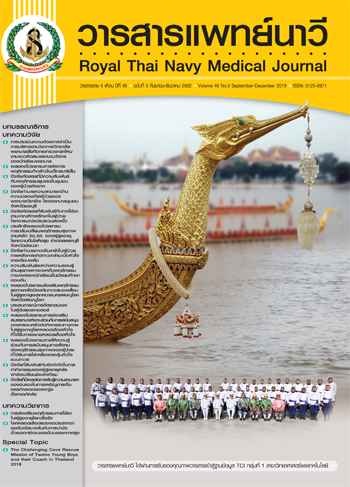A Needs Assessment of Academic Management for Nursing College under the Jurisdiction of Ministry of Defence Based on the Concept of Innovator Competencies of Nursing Students
Main Article Content
Abstract
The purposes of the survey research were 1) to examine current state and the desirable state of Nursing Colleges under the jurisdiction of the Ministry of Defence (MOD) based on the concept of innovator competencies of nursing students, and 2) to set the priorities of the needs of MOD’s Nursing College based on the concept of innovator competencies of nursing students. The samples of study were of 3 state of MOD’s Nursing College. Current and desirable states of Questionnaires were used as tools to collect data. Frequency, percentage, mean/average, standard deviation and PNImodified were used to analyze the collected data.
The research finding showed that
1) The overall current and the desirable state of MOD’s Nursing College based on the concept of innovator competencies of nursing students were of high level ( = 3.482, SD = 0.715) and highest level ( = 4.701, SD = 0.519), respectively.
2) The priority of needs for MOD’s Nursing College based on the concept of innovator competencies of nursing students, the research found the needs from PNImodified highest to PNImodified lowest to be measurement and evaluation management (PNImodified = 0.3659), maker space management (PNImodified = 0.3587), research management (PNImodified = 0.3507), curriculum management (PNImodified = 0.3400), and teaching management (PNImodified = 0.3366), respectively.
Article Details

This work is licensed under a Creative Commons Attribution-NonCommercial-NoDerivatives 4.0 International License.
References
Narasingha M. The human development for driving to Thailand 4.0. [Internet]. [cited 2017 May 28]. Available from: https://mgronline.com/daily/detail/9600000120293.
Sawangchit S. The development strategies for nursing college under the Jurisdiction of Ministry of Defence according to the concept of high performance organization. [Doctoral Dissertation, Faculty of Education]. Chulalongkorn University; 2016. (in Thai).
Royal Thai Navy College of Nursing. Bachelor of Nursing Science Program Revised Curriculum Academic Year 2018; procedure.
Choeisuwan V. Teaching nursing students to develop creative thinking. Royal Thai Navy Medical Journal 2019;46(2):35-47. (in Thai).
Wonganuttaroch P. Academic administration. Bangkok: Pimdee Limited; 2010. (in Thai).
Sarnswang S. Handout on academic administration of higher education. [Internet]. [cited 2017 May 2]. Available from: www.arit.rmutp.ac.th/kms/wp-.
Couros G. The innovator's mindset: empower learning, unleash talent, and lead a culture of creativity. SanDiago, CA: Dave Burgess Consulting; 2013.
Sutthawart W, Siriwong P. The basic educational innovator in public sector: a study for grounded theory. Varidian E-Journal, Silpakorn University 2015;8(2):281-300. (in Thai).
Hongladarom J. 8K's+5K's Human capital of Thai people supporting the ASEAN Community. Bangkok: Asia Pacific Consultants; 2012. (in Thai).
Kimbrough R, Nunnery M. Education administration: an introduction. London: Collier Macmillan; 1988.
Prachyapruit A. A new paradigm of academic work in a changed higher education. Dhonburi Rajabhat University Journal 2007;2(1):71-86. (in Thai).
Netasit A. The development of an academic administration model for autonomous universities. [Doctoral Dissertation, Faculty of Education]. Chulalongkorn University; 2010. (in Thai).
Sinlarat P. The higher education. 2nd ed. Bangkok: Chulalongkorn University Press; 2015. (in Thai).
Nancy D, Patricia M. CNS entrepreneurs: innovators in patient care. [Internet]. [cited 2018 November 29]. Available from: https://www.nursingcenter.com/smartsearch? search= innovators+in+patient+care.
Candice M. Military nursing competencies. Nursing Clinic 2010;45(2):169-77.
Dyer JH, Gregersen H, Christensen CM. The innovator's DNA. [Internet]. [cited 2018 November 29]. Available from: https://hbr.org/2009/12/the-innovators-dna?cm_sp=Topics-_-Links-_-Read+These + First.
Wagner T. Creating innovators: the making of young people who will change the world. United States: Scribner/Simon & Schuster publisher; 2012.
White KR, Pillay R, Huang X. Nurse leaders and the innovation competence gap. Nurs Outlook 2016;64(3):255-61.
Yamane T. Statistics: an introductory analysis. 3rd ed. New York: Harper & Row Publications; 1973.
Vongvanich S. Needs assessment research. 4th ed. Bangkok: Chulalongkorn University Press; 2015. (in Thai).
Lucas B, Claxton G, Spencer E. Progression in student creativity in school: first steps towards new forms of formative assessments, OECD Education Working Papers, No.86. Paris: OECD Publishing; 2013.
Takkawatakarn M. Development of activity sets to promote creative skills for elementary school students. [Master’s Thesis, Faculty of Education]. Chulalongkorn University; 2013. (in Thai).
Dewey J. Philosophy, education, and reflective thinking. In: Buford TO, editor. Toward a philosophy of education. New York: Holt, Rinehart and Winston; 1969.
Office of the Education Council. (Draft) Monitoring and evaluation framework for educational management, 2014. [Internet]. [cited 2018 November 15]. Available form: http://onec.go.th/onec_backoffice/uploaded/Category/ Evaluation/DraftFrameEduEva.pdf.
Punmanee A. Thinking practice: creative thinking. Bangkok: Chulalongkorn University Press; 2014. (in Thai).
Rukhamate P. High performance organization in the public sector: structural contingency theory and cultural approach. Journal of Management Sciences 2010;27(1-2):33-46.


